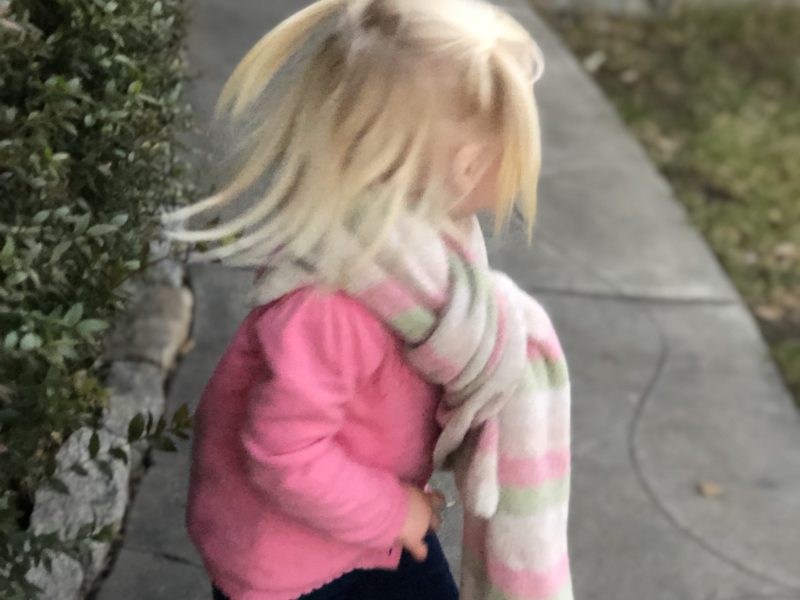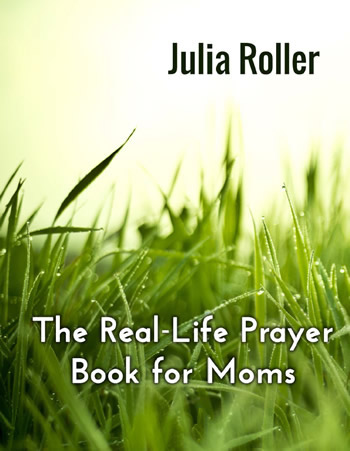Several days a week my 2-year-old daughter and I walk several blocks to our church, either for services or Bible study or for her morning preschool. We live so close that I often tell people it’s quicker to walk than to drive and search for parking. That is probably true when it’s just me walking, but it doesn’t take into consideration the peculiarities of walking with a toddler.
Each time we leave the house she insists of course on wearing her backpack, which is so large on her that it looks like her turtle shell. Sometimes I worry it will pull her over backwards. And our pace is, well, uneven. Sometimes we walk; sometimes we gallop or skip. Sometimes she wants me to carry her. Sometimes we run (as fast as her tiny legs and backpack will allow). We definitely have to step on all the stepping stones along the way and jump off any benches or ledges. If there’s a dog, we stop and ask to pet it. A dandelion, we pause and blow its frothy white seeds. (Sorry, neighbors.) The walk can take several minutes or it can take 20.
It’s quite a contrast from when I walk by myself. Invariably I walk as quickly as possible, looking straight ahead or (sadly) down at my phone. I generally do not stop to pet dogs or enjoy flowers. It would never occur to me to jump off a ledge just because it’s there.
So the sheer slowing down-ness of walking with my daughter can be maddening. It’s so far removed from my usual practice. Yet when I reflect on my day, I often view these walks as the one of the highlights.
Two-year-old joy and enthusiasm is contagious. I dare anyone not to crack a smile at this little girl in pigtails galloping down the road wearing her turtle-shell backpack. She places her hand trustingly in mine and smiles up at me as she chatters about her preschool friends and her favorite toys. Walking with her is about the most powerful reminder I can imagine that life is about the journey rather than the destination. Who cares, really, when we get there? Or if we ever get there?
I’ve grown to view walking with a toddler as a spiritual practice.
If you’re at all like me, you spend a lot of your life rushing around. It’s physically and mentally exhausting. I’m firmly convinced that one of the most important things I can do is to force myself to slow down. God did not design us to rush around all the time, never stopping to enjoy creation or jump off a rock or revel in our companions.
It’s all too easy to tell ourselves that we don’t have time to slow down. That we’ll take our time at some later point. I could easily keep on telling myself this forever…or at least until it’s too late because she is walking to school with her friends rather than me. Or (gulp) driving off to college.
Children help us to see the world in a different way. When it comes to walking and many other things, I think their vision is a lot more like Jesus’s than my own. The Bible never tells us about Jesus chiding someone asking for healing for making him late or saying to anyone ever that he didn’t have time. He’s not someone you’d describe as schedule-driven or even perhaps particularly efficient. But the testimony of the Bible is that he was extraordinarily present with his companions.
Take the story in Luke about Jesus joining two of his disciples on their walk to Emmaus. They are mourning Jesus’ recent death on the cross, despite the fact that the women have found his tomb empty and reported seeing Jesus. The two disciples are sad, presumably, because they have not yet seen Jesus and don’t know what to think about his resurrection. And then here is Jesus, joining them on their walk and talking to them about the meaning of his own life and death and how it is all described in the scriptures. Yet they do not know who he is. They seem to have spent a long and leisurely time together. The two disciples walk and talk with the man they do not yet know is Jesus and then they encourage him to stay and eat with them, and then, finally, when he breaks and blesses the bread, “their eyes were opened, and they recognized him” (Luke 24:31). As soon as they recognize him, Jesus disappears.
Only then do they realize the importance of their earlier walk. It’s almost hard for me to believe Jesus could have the patience to not immediately reveal himself or that they could walk along with him for so long without understanding who he was. They were so focused on the shocking truth of Jesus’ death that they could not see its fulfillment right there before them.
It takes slowing down and time for reflection to see what is, sometimes, right before us.
Whether you’re walking today with your toddler or your dog or by yourself, try to slow down. See what it feels like to stroll rather than stride, to amble rather than rush. Smile at the people you pass. Pet a dog if you like. Then see if you feel any different when you reach your destination.
Maybe then, maybe even later, you might find, as I do, that it’s moments like these that are at the heart of our spiritual lives. . . even when we don’t know it at the time.






Em Cummins
This is an absolutely enchanting reflection that took me back nearly a half-century when we adopted our first child, son Chad. I was already 30 years old and more than ready to try my hand at being a father. Once Chad mastered the art of toddling we frequented the byways of our Talmadge Park neighborhood, never actually going anywhere but simply exploring the enormously fascinating world through the eyes of a toddler. Nothing was too insignificant to ignore, from the little weeds between the cracks of the sidewalks to the small pebbles strewn in our path.
It suddenly occurred to me that prior to this time, all these tiny miracles of nature had been invisible to my eyes: from the colorful striations in a tiny rock fragment to the petite yellow blossom atop a half-inch high botanical invader (recalling Tennyson’s “Flower in the Crannied Wall”).
The miraculous is often hidden in the unremarkable routines of daily life. Thanks for sharing this discovery made possible by your darling daughter.
juliaroller
Thank you, Em! I’m so glad you enjoyed my post, and I love your observation about how the miraculous is often hidden in the unremarkable routines of daily life. That is one of the most important lessons parenting has taught me.